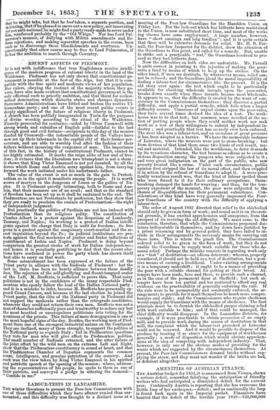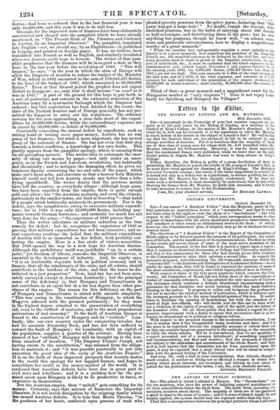AMENITIES OF AUSTRIAN FINANCE.
THE Austrian budget for 1854, it is announced from Vienna, shows a serious deficit, somewhat falsifying the anticipation of friendly writers who had anticipated a diminished deficit for the current year. Continually Austria is reporting that she has overcome the Bottle Imp of her exchequer,—deficit ; and as continually. the Imp is found back again in the Imperial pocket. Financiers have boasted that the deficit of the terrible year 1849-120,000,000
florins—had been so reduced that in the last financial year it was only 54,000,000, and this year it was to be still less.
Grounds for the improved state of finances have been elaborately constructed and shaped into the pamphlet which we have already mentioned, on "The Present State of the Finances and Currency in Austria, by an Impartial Observer." The pamphlet, translated into English—not, we should say, by an Englishman—is published in Leipzig, and printed on foreign paper. It has, we believe, been translated into French as well as English, and similarly circulated wherever Austria could hope to borrow. The writer of that pam- phlet prophesies that the finances will be in as good a state as they were in the last year before the revolution of 1849. " This will happen," he says, " in the year in which the state of Europe will allow the Emperor of Austria to reduce the budget of the Ministry of War, which in 1852 amounted to the sum of 110,843,321 florins, to the level of the budget of 1847, which amounted to 62,968,096 florins." Even at that blessed period the prophet does not expect Deficit to disappear ; no, only that it shall become "as small as it was in 1847." A part of the ground for this hope is put forth in
sort of postscript, and consists in the extensive reduction of the Austrian army by a systematic furlough which the Emperor had ordered : but this expectation has been falsified by the event; the state of the Turkish frontier and of Europe generally has not per- mitted the Emperor to carry out his reductions. The ordinary revenue for the year approaching a close falls short of the expen- diture by 45,000,000 florins, while the extraordinary expenses are in excess by 50,000,000—a deficit of 95,000,000.
Constantly concealing the annual deficit by expedients, such as raising loans or issuing more paper-money, Austria has no real grasp of her finances ; but what is more important, she has no real grasp• of the rationale of finance. She has not even that first step towards a better condition, a knowledge of her own faults. This plainly appears from the pamphlet apology, which is amusing from its all-pervading naiveté. This writer tries to extenuate the enor- mity of eking out means by paper,—not only under an emer- gency, as in the French and American revolutions, but habitually and chronically ; and to mitigate the damaging effect, he gives vo- luminous figures concerning the ins and outs of the paper, which make one's head ache, and convince us that a heaven-born Minister himself could not tell how Austria stands any better than a kite- flying spendthrift. The writer denies that the precious metals have left the country, as everybody alleges : although large quan- ties have been exported from the empire, there is quite enough gold and silver ; but " the Austrian peasants, and even the citizens, particularly in the smaller towns, are fond of hoarding "—that habit of a people which habitually mistrusts its government. Nor is the deficit, says the pamphleteer, owing to excessive military expendi- ture ; for in 1845 it was only 52,000,000 florins, including pay- ments towards German fortresses ; and certainly too much has not been done for the army—" the experience of 1848 proves that." Thus the writer calculates on military reduction as the true remedy for deficit; but he recognizes the experience of 1848 as proving that military expenditure has not been excessive ; and re- cent experience confirms the belief that the military expenditure of Austria will be as immortal as her deficit, both probably out- lasting the empire. Here is a fine circle of vicious necessities. But 1848 opened the way to a new hope for Austrian finance. Although the prohibitory tariff was justifiable " up to a certain point," yet freedom of labour, concedes the Impartial Observer, is essential to the development of industry. And, he sagely says, "it is an irrefutable requisite both in political economy and in finance, that all the inhabitants of the state, and all estates, should contribute to the burdens of the state, and that the taxes be dis- tributed in a just proportion." Now, land-tax has not been accu- rately surveyed, except in Austrian Lombardy; but the principal cause of the deficiency is, that Hungary and Transylvania do not contribute in an equal but in a far less degree than other pro- vinces of the empire. The reason for this deficiency on the part of Hungary and Transylvania is stated with amiable simplicity. "This was owing to the constitution of Hungary, to which the Mag.ysrs adhered with the greatest pertinacity ; for they were in the highest degree attached to the preservation of everything old, even to the rubbish of centuries, and to the most preposterous perversions of real economy." So the fault of Austrian finance is traced to the constitution of Hungary and its " rubbish." Lom- bardy, like our own country under the conquering invader, has had its accurate Doomsday Book, and has not been suffered to commit the fault of Hungary; for Lombardy, with an eighth of the population, supplies a quarter of the revenue. Having been cleared of her "rubbish," Hungary will be brought up to the Aus- trian standard of taxation. "The Emperor Francis Joseph, not having sworn to the constitution," was released from the obliga- tion to maintain it ; and " it was possible practically to put into execution the great idea of the unity of the Austrian Empire." It is on the faith of those improved prospects that Austria makes to the world this apology for her laggard finance, and hopes to consolidate her credit in the money-market of the world. It is confessed that Austrian deficits have been due in great part to civil wars and rebellions; and it is a problem how far the pro- raised screw upon Hungary is likely to be productive in taxes, or expensive in insurrection.
But the Austrian empire, thus "united," gets something for its money- Certainly, says that naivest of financiers the Impartial Observer, it is not lavish dissipation by the reigning family which has sawed Austrian deficits. It is true that Maria Theresa, "in the goodness of her heart, conferred upon persons of rank who pleaded poverty pensions from the privy purse, declaring that this purse had got a large hole.' " No doubt, Joseph the Second, who abolished pensions, was in the habit of carrying about 100 ducats or half-sovereigns, and.distributing them to the poor; but he was anything but pompous, though he knew well, " on solemn occa- sions and particular circumstances, how to display a magnificence worthy of a great monarch." " When we consider how indispensably requisite a court suitable to Ins dignity is to a great monarch, how numerous the members of the Imperial Family are, the manifold expenses to be defrayed by the civil list, and how many presents must be made as proofs of the Imperial satisfaction, in sup- port of individuals, &c., it must be confessed that the Court expenses in the administrative year (which begins November 1 and expires October 31 of the ensuing year) 1852, viz. 5,950,491 florins, (159,357 florins less than in 1851,) are not too high. This sum amounts to 1-38th of the total income of the said year, and to 1-47th of the total expenses, and amounts to 9 7-19 creuzers for each individual of the population of the empire (reckoned at 38,000,000 in round numbers ; more exactly, 38,388,000 after the census of 1852)."
Think of that—a great monarch and a magnificent court for the Hungarian market at "only sixpence " ! Does it not repay Lom- bardy for Spielberg and Hungary for Villagos



































 Previous page
Previous page